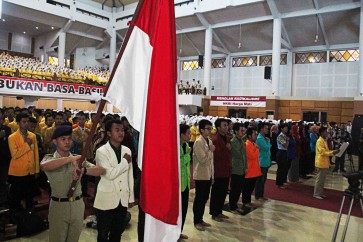Popular Reads
Top Results
Can't find what you're looking for?
View all search resultsPopular Reads
Top Results
Can't find what you're looking for?
View all search resultsWider student movement ‘could curb’ campus radicalism in Indonesia
Campuses have long become recruitment grounds for radical Islamic groups, with the State Intelligence Agency (BIN) noting in 2017 that 39 percent of state university students across 15 provinces in Indonesia had shown an interest in radical teachings.
Change text size
Gift Premium Articles
to Anyone
 Against radicalism: Thousands of students from the Semarang State University and representatives of universities across Central Java and Yogyakarta declare their faith in the Unitary State of the Republic of Indonesia and commitment to fight against radicalism in an event in Semarang on May 6. (JP/Suherdjoko)
Against radicalism: Thousands of students from the Semarang State University and representatives of universities across Central Java and Yogyakarta declare their faith in the Unitary State of the Republic of Indonesia and commitment to fight against radicalism in an event in Semarang on May 6. (JP/Suherdjoko)
T
he lack of varied and critically minded student movements might have contributed to the growing radicalism in campuses after the fall of Soeharto, experts say.
Campuses have long been recruitment grounds for radical Islamic groups, with the State Intelligence Agency (BIN) noting in 2017 that 39 percent of state university students across 15 provinces in Indonesia had shown an interest in radical teachings.
“Radical [Islamic] teachings started entering universities when the Soeharto regime implemented the NKK/BKK policy in the 1980s, by which students were banned from political activities. The vacant political space then made room for radical groups to enter,” The Habibie Center research director Mohammad Hasan Ansori said during a discussion on campus radicalism on Thursday.
Ansori was referring to Soeharto’s New Order policy that barred external organizations affiliated with political parties from setting up inside campus.
Among these organizations were the Indonesian Nationalist Student Movement (GMNI) and the Association of Islamic Students (HMI), both of which had produced well-known politicians, such as Vice President Jusuf Kalla.
As a result, the organizations are not funded nor directly facilitated by state universities.
Saiful Umam, former executive director at the Center for the Study of Islam and Society (PPIM) at Syarif Hidayatullah State Islamic University (UIN Jakarta), said the policy resulted in the proliferation of Islam-related campus activities organized by Muslim student groups in each university, usually known as the Campus Dakwah Institution (LDK).

















